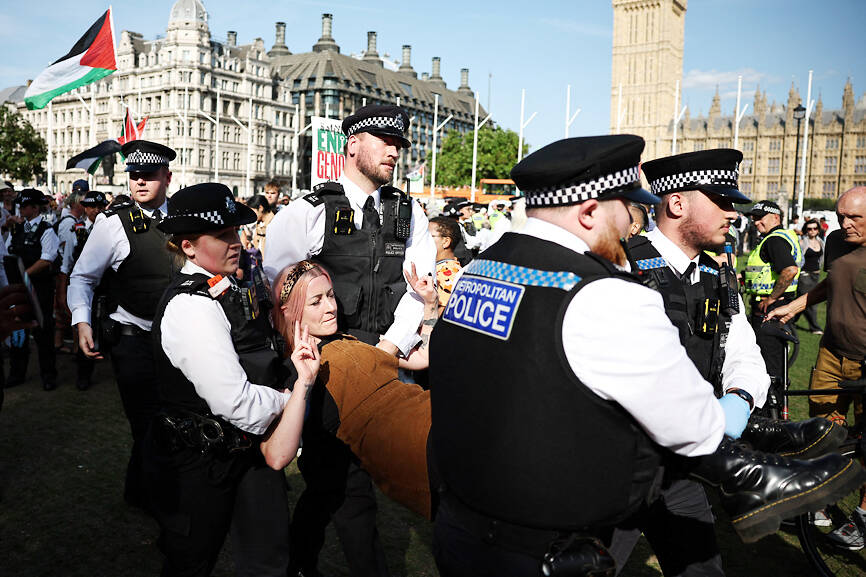Police in London on Saturday arrested 466 people for supporting Palestine Action at the latest and largest protest backing the group since the British government banned it last month under anti-terror laws.
The Metropolitan Police said it had made the arrests, thought to be one of the highest numbers ever at a single protest in the UK capital, for “supporting a proscribed organization.”
It also arrested eight people for other offences including five for alleged assaults on officers, although none were seriously injured, it added.

Photo: AFP
The British government outlawed Palestine Action early last month, days after it took responsibility for a break-in at a British air force base in southern England that caused an estimated £7 million (US$9.4 million) of damage to two aircraft.
The group said its activists were responding to Britain’s indirect military support for Israel amid the war in Gaza.
The British Home Office reiterated ahead of Saturday’s protests that Palestine Action was also suspected of other “serious attacks” that involved “violence, significant injuries and extensive criminal damage.”
However, critics, including the UN and groups such as Amnesty International and Greenpeace, have condemned the move as legal overreach and a threat to free speech.
A group called Defend Our Juries, which organized Saturday’s protests and previous demonstrations against the ban, said “unprecedented numbers” had risked “arrest and possible imprisonment” to “defend this country’s ancient liberties.”
“We will keep going. Our numbers are already growing for the next wave of action in September,” it added.
Attendees began massing near parliament at lunchtime bearing signs saying: “Oppose genocide, support Palestine Action” and other slogans, and waving Palestinian flags.
Psychotherapist Craig Bell, 39, was among those holding a placard. For him, the ban was “absolutely ridiculous.”
“When you compare Palestine Action with an actual terrorist group who are killing civilians and taking lives, it’s just a joke that they’re being prescribed a terrorist group,” he said.
As police moved in on the demonstrators, who nearly all appeared to offer no resistance, attendees applauded those being arrested and shouted “shame on you” at officers.
“Let them arrest us all,” said Richard Bull, 42, a wheelchair-user in attendance. “This government has gone too far. I have nothing to feel ashamed of.”
However, British Home Secretary Yvette Cooper insisted late Saturday Palestine Action had been outlawed “based on strong security advice” and following “an assessment from the Joint Terrorism Assessment Centre that the group prepares for terrorism.”
“Many people may not yet know the reality of this organization,” she said, adding it “is not non-violent.”
“The right to protest is one we protect fiercely, but this is very different from displaying support for this one specific and narrow, proscribed organization,” she said.
Police forces across the UK have made scores of similar arrests since the government outlawed Palestine Action on July 5, making being a member or supporting the group a criminal offence punishable by up to 14 years in prison.
Police announced this week that the first three people had been charged in the English and Welsh criminal justice system with supporting Palestine Action following their arrests at a July 5 demo.
Seven people have so far been charged in Scotland, which has a separate legal system.
Amnesty International UK chief executive Sacha Deshmukh wrote to Met Commissioner Mark Rowley this week urging restraint be exercised when policing people holding placards expressing support for Palestine Action.
“The arrest of otherwise peaceful protesters is a violation of the UK’s international obligations to protect the rights of freedom of expression and assembly,” Amnesty said Saturday on X.
A UK court challenge against the decision to proscribe Palestine Action would be heard in November.

Shamans in Peru on Monday gathered for an annual New Year’s ritual where they made predictions for the year to come, including illness for US President Donald Trump and the downfall of Venezuelan President Nicolas Maduro. “The United States should prepare itself because Donald Trump will fall seriously ill,” Juan de Dios Garcia proclaimed as he gathered with other shamans on a beach in southern Lima, dressed in traditional Andean ponchos and headdresses, and sprinkling flowers on the sand. The shamans carried large posters of world leaders, over which they crossed swords and burned incense, some of which they stomped on. In this

Near the entrance to the Panama Canal, a monument to China’s contributions to the interoceanic waterway was torn down on Saturday night by order of local authorities. The move comes as US President Donald Trump has made threats in the past few months to retake control of the canal, claiming Beijing has too much influence in its operations. In a surprising move that has been criticized by leaders in Panama and China, the mayor’s office of the locality of Arraijan ordered the demolition of the monument built in 2004 to symbolize friendship between the countries. The mayor’s office said in

‘TRUMP’S LONG GAME’: Minnesota Governor Tim Walz said that while fraud was a serious issue, the US president was politicizing it to defund programs for Minnesotans US President Donald Trump’s administration on Tuesday said it was auditing immigration cases involving US citizens of Somalian origin to detect fraud that could lead to denaturalization, or revocation of citizenship, while also announcing a freeze of childcare funds to Minnesota and demanding an audit of some daycare centers. “Under US law, if an individual procures citizenship on a fraudulent basis, that is grounds for denaturalization,” US Department of Homeland Security Assistant Secretary Tricia McLaughlin said in a statement. Denaturalization cases are rare and can take years. About 11 cases were pursued per year between 1990 and 2017, the Immigrant Legal Resource

‘RADICALLY DIFFERENT’: The Kremlin said no accord would be reached if the new deal with Kyiv’s input did not remain within the limits fixed by the US and Russia in August Ukrainian President Volodymyr Zelenskiy is to meet US President Donald Trump in Florida this weekend, but Russia on Friday accused him and his EU backers of seeking to “torpedo” a US-brokered plan to stop the fighting. Today’s meeting to discuss new peace proposals comes amidst Trump’s intensified efforts to broker an agreement on Europe’s worst conflict since World War II. The latest plan is a 20-point proposal that would freeze the war on its current front line, but open the door for Ukraine to pull back troops from the east, where demilitarized buffer zones could be created, according to details revealed by